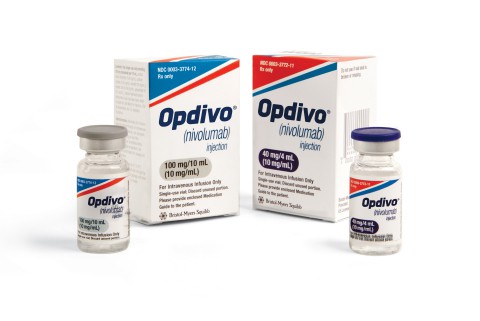
EMA approves BMS’ Opdivo for advanced skin cancer
pharmafile | April 27, 2015 | News story | Sales and Marketing | BMS, Bristol-Myers Squibb, EMA, Merck, Yervoy, ipilimumab, keytruda, melanoma, nivolumab, opdivo, pembrolizumab, skin cancer
Bristol-Myers Squibb has earned a recommendation from the EMA for its cancer immunotherapy treatment Opdivo as a monotherapy for patients with advanced melanoma.
In its April meeting the EMA’s Committee for Medicinal Products for Human Use (CHMP) agreed that Opdivo (nivolumab) should be granted a marketing authorisation as a treatment for adults with advanced (unresectable or metastatic) melanoma. The CHMP opinion will now be sent to the European Commission for a decision on an EU-wide marketing authorisation.
The green-light means that Opdivo becomes the first cancer treatment selectively targeting PD-1, an immune system pathway involved in tumour development, recommended for approval in the EU. It is already approved in the US for non-small cell lung cancer (NSCLC) and melanoma, and the latest regulator OK continues the company’s charge in immuno-oncology.
The advance of immuno-therapies like anti PD-1 and other ‘checkpoint inhibitors’ means that patients with melanoma have additional alternatives to chemotherapy-based treatments, including monoclonal antibodies, BRAF V600 and MEK inhibitors, that have significantly improved outcomes.
It comes as BMS released new Phase II trial data showing positive results when Opdivo is combined with Yervoy (ipilimumab), another BMS anti PD-1 therapy, in patients with previously untreated advanced melanoma. The study compared the combination with Yervoy alone in 142 patients with previously untreated advanced (stage III or IV) melanoma. Patients with BRAF wild-type tumours treated with the combination regimen showed a higher objective response rate (ORR) of 61% – the primary study endpoint – compared to 11% of patients given Yervoy monotherapy.
The combination treatment had a ‘generally consistent’ safety profile, although the incidence of drug-related grade 3 or 4 adverse events was higher with the combination (54%) compared to patients who received monotherapy (24%). The most common were colitis (17%), diarrhoea (11%), and elevated alanine aminotransferase (11%). The combination was discontinued due to treatment-related adverse events in 47% of patients versus 17% for monotherapy.
“We are pleased with the CHMP positive opinion, as it is a step closer to us bringing this important medicine for those advanced melanoma patients in Europe in need of new options,” says Michael Giordano, senior vice president and head of development, oncology at BMS.
And speaking on the clinical trial results which were presented at the American Association for Cancer Research conference in Philadelphia this month, Giordano says: “The results reinforce our belief that the future lies in the combination of immuno-oncology agents that can leverage the immune system in order to offer cancer patients options with greater efficacy beyond current treatment approaches.”
BMS may still face competition from other rivals in immuno-oncology, however. At the same conference, a Phase III head to head trial comparing Merck’s Keytruda (pembrolizumab) and Yervoy in patients with advanced melanoma found Keytruda beat Yervoy in progression-free survival (PFS) and overall survival (OS).
The interim analysis of data from more than 800 patients found the median PFS for Keytruda was 5.5 months for people treated every two weeks and 4.1 months every three weeks, compared to 2.8 months for Yervoy (every three weeks). One-year OS for Keytruda was 74.1% (2-week group) and 68.4% (3-week group), compared to 58.2% for Yervoy.
Commenting on the results, Dr James Larkin, consultant medical oncologist at the Royal Marsden hospital says: “This is an important set of results because it is the first time that one of the newer anti-PD1 immunotherapy drugs has been compared head to head with an established immunotherapy drug.
“This trial has shown significant prolongation of disease control and increased survival for those treated with pembrolizumab in comparison with ipilimumab, so is another major step forward for patients with advanced melanoma.”
Lilian Anekwe
Related Content

TILT Biotherapeutics shares data on TILT-123 with Keytruda for ovarian cancer treatment
TILT Biotherapeutics has announced promising preliminary safety and efficacy data from its ongoing phase 1 …

FDA approves Merck’s Winrevair for PAH treatment
Merck, known as MSD outside of the US and Canada, has announced that the US …

Merck shares results for Keytruda in cervical cancer treatment
Merck, known as MSD outside of the US and Canada, has announced positive results from …








